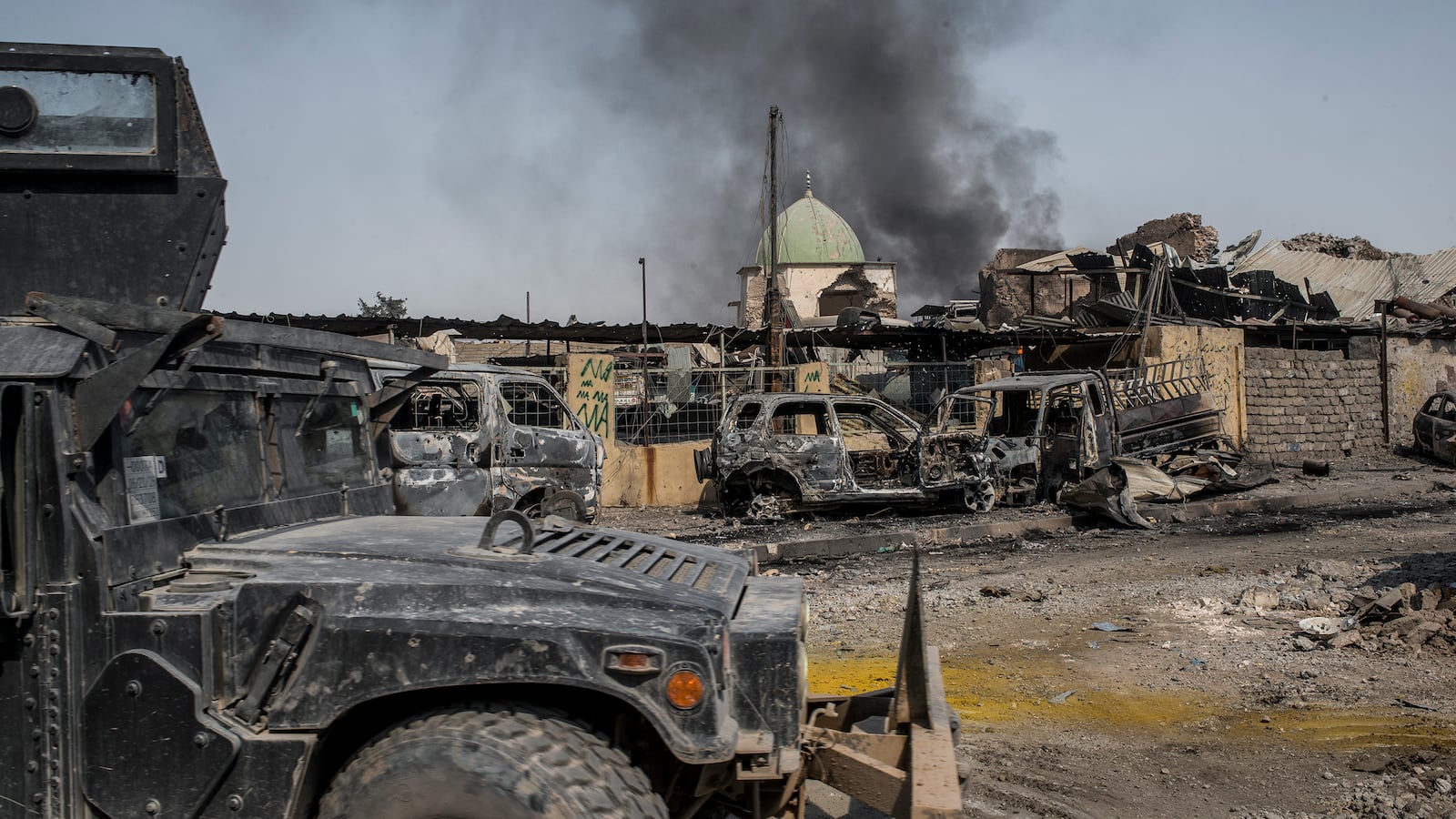MOSUL, Iraq—The soldiers guarding the demolished mosque barely register the high-pitched whistle of the bomb plunging toward them. They are too preoccupied with the Humvees that slowly make their way down the road, dodging rubble as they roll past destroyed houses and deep craters. The screech of the bomb’s tail fin becomes louder, then ends abruptly as a loud explosion shakes the ground and a plume of smoke shoots up into the air a few dozen meters away.
The fighters cast a few sideways glances, and then focus their attention on the officers emerging from the Humvees. Some of Iraq’s top brass have come to the al-Nuri mosque in Mosul’s historic city center, where elite counterterrorism troops are fighting to eliminate the last pocket of ISIS resistance in the city.
The mosque and its iconic leaning minaret became symbolic of the insurgents’ rise when ISIS leader Abu Bakr al-Baghdadi declared his self-styled caliphate in the ancient place of worship after storming Mosul in June 2014.
Three years later, a few hundred surviving jihadists holed up in the old city blew up the mosque before retreating, unwilling to let the symbol of their former might fall to the Iraqis.
Staff officers clad in the black uniform of the Iraqi Special Operations Forces step out of their vehicles, smiling and posing for selfies with their adoring soldiers. A general waving an Iraqi flag leads a throng of men over a pile of stones and under the dome of the mosque, which had miraculously survived the destruction. With the yet-to-be vanquished foe only a short distance down the road, the general holds a victory speech to loud cheers from the uniformed crowd.
The officers get back into their vehicle and drive off, and the silence over the ruins is only punctuated by more airstrikes, which deliver deadly payloads at a steady rhythm, and the occasional burst of machine gun fire as the soldiers in the front positions keep their opponents at bay.
The men of ISOF retreat into the shade of nearby houses, drinking water from iceboxes and covering their heads with checkered scarves. Veterans of the bloody struggle in Iraq to roll back the so-called Islamic State, they have done the bulk of the fighting in Mosul, and have suffered heavy losses. The elite soldiers have wrested neighborhood after neighborhood from the insurgents in a nine-month battle, and are now slowly pushing through the labyrinth of narrow alleys and crumbling stone houses of the old city toward the Tigris river.
The claustrophobic house-to-house fighting has surpassed anything that came before it in intensity, they say. With nowhere left to retreat, the jihadists are mounting a desperate defense, prompting the Iraqis to request airstrikes from the U.S.-led coalition on any building suspected to be an enemy position. The fanatical insurgents have no plans to surrender, and many of them are foreigners with nothing left to lose.
“The Iraqi Daesh [ISIS] fighters are trying to escape, but the European ones usually fight to the death,” says Falah Hassan, a grizzled ISOF soldier who has taken part in every major battle against the insurgents in the past three years.
The jihadists mixing in with civilians often blow themselves up when they reach Iraqi lines, and suicide attacks have become the main danger for the Iraqi troops.
“Most of the time we are dealing with suicide bombers, not fighters,” says another ISOF soldiers.
The surviving insurgents have retreated into the old city with their families, and many of the jihadi wives are as fanatical as their husbands. Stories circulate among the soldiers of female ISIS fighters, foreign women who came to the self-proclaimed caliphate when it stretched across vast swathes of Iraq and Syria. But more often, ISIS women mix with civilians making a run for it.
“A woman blew herself up here yesterday. She didn’t get close to us, but she killed a lot of civilians. More than 10,” says the soldier, casually waving at the street running past the mosque.
The troops at the front line have developed ways to protect themselves against disguised suicide attackers. Fleeing men are told to lift their shirts to check if they are wearing explosive vests. But in conservative Iraqi society, asking this of the women is not an option, and it makes the soldiers vulnerable to female attackers. They do what they can to minimize the risk.
“When a group of civilians comes toward us, we ask the older men to point out who belongs to their family. When a woman walks by herself we get suspicious. Most of them notice that and start running toward us,” says Hassan, who leaves open the question of what happens to a woman running toward a group of nervous soldiers with their fingers on the trigger.
In response to the lethal threat posed by the emaciated, dishevelled civilians, the soldiers try to keep them at a distance. As the men at the mosque lounge in the shade, a family turns a corner and slowly staggers toward them.
Gaunt figures barely able to carry hastily packed bags, bushy bearded men and pale women stop to gather their strength in the remorseless summer heat. An old woman cannot continue, and is dragged along by a man and his wife. The family is at breaking point, mentally and physically. Their house had been hit by an airstrike, and they were trapped in the ruin until ISOF soldiers dug them out of the rubble.
When they get close to the soldiers at the mosque, they are shooed away, and told to continue their journey to the nearest medical station on foot in the blazing heat. Before they get far, an officer arrives and takes pity. A Humvee is readied and the family is driven out of the ruined city center.
At the medic station, they slump onto the curb. Anxiety remains etched in their faces as they begin to realize they are safe at last.
“The last few days we were not sleeping, we just wanted to get out,” says one of the women.
Since Iraqi forces broke into the old city, the bombardment has been so intense that the family did not even realize that ISIS had blown up the al-Nuri mosque only meters from their house.
“We only realized it was gone when we went outside,” says the women.
When it is not using civilians as cover for suicide attacks, ISIS tries to prevent civilians from crossing the front lines, and the jihadists shoot anyone they catch escaping. The use of human shields has for some time inhibited the use of coalition air power. But to support the Iraqi forces as they push into the easily defended old city, air strikes have been stepped up with little regard for the families trapped inside.
This does not sit well with the survivors. Wathah, a 15-year-old boy who has managed to reach the medical station with his family, is indignant as he recounts the battle from a civilian perspective.
“When there is one Daesh fighter in a house, they destroy the whole building, even though there is a family inside. They don’t care,” he says angrily.
The men of ISOF also become angry when they think of the losses the battle has inflicted on them. The Iraqi high command refuses to divulge casualty rates, but a U.S. budget request for military assistance to Iraq, released in May, puts the casualty rates of the elite soldiers at 40 percent.
“A lot of my good friends have died. This is not easy for me,” says Hassan. The gaze from his leathery face turns hard, and he vows to avenge his fallen comrades by crushing ISIS in the urban hell of Mosul’s old city.






